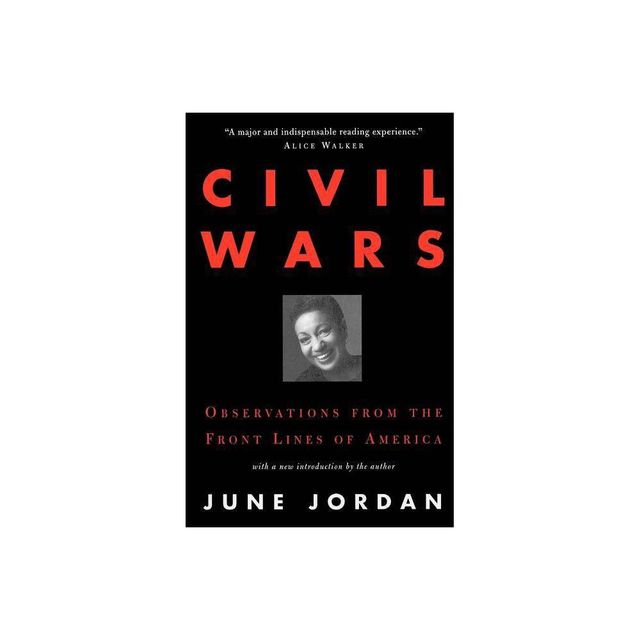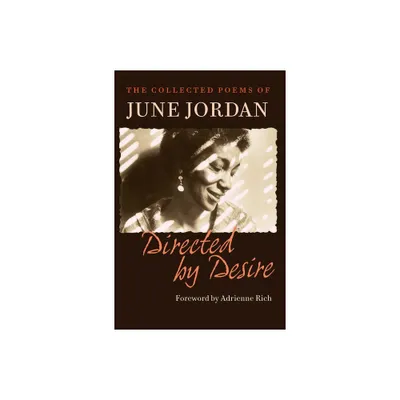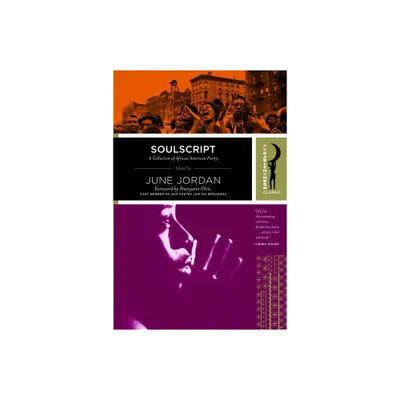Home
June Jordan: Her Life and Letters
Loading Inventory...
Barnes and Noble
June Jordan: Her Life and Letters
Current price: $55.00


Barnes and Noble
June Jordan: Her Life and Letters
Current price: $55.00
Loading Inventory...
Size: OS
*Product Information may vary - to confirm product availability, pricing, and additional information please contact Barnes and Noble
June Jordan was born on July 9, 1936, in Harlem, New York, to Mildred and Granville Jordan, Jamaican natives. During her life, she became one of the most prolific, important, and influential African American writers of her time. Before her death from breast cancer in 2002, Jordan published more than 27 books, including
Some of Us Did Not Die
,
Solider: A Poet's Childhood
Poetry for the People: Finding a Voice through Verse
Haruko Love Poems
, and
Naming Our Destiny
. Her work
Civil Wars
, a collection of letters and essays, addressed such topics as violence, homosexuality, race, and black feminism. Working in many genres and touching on many themes and issues, Jordan was a powerful force in American literature. This biography reveals the woman, the writer, the poet, the activist, the leader, and the educator in all her complexity.
Working in many genres and touching on many themes and issues, June Jordan was a powerful force in American literature. This biography reveals the woman, the writer, the speaker, the poet, the activist, the leader, and the educator in all her complexity.
, a collection of letters and essays, addressed such topics as violence, homosexuality, race, and black feminism.
Kinloch offers a life and letters of this prolific writer, delving into both her biography and her contributions as a writer and activist. This approach unveils the power of language in Jordan's poems, essays, speeches, books—and ultimately in her own life—as she challenged political systems of injustice, racism, and sexism. Kinloch examines questions surrounding the pain of writing, the anger of oppression, and the struggle of African American women to assert their voices. Attention is paid to the ways in which Jordan's life informed her writings her perspectives, and her contributions to the global landscape of class, race, and gender issues. The writer's major works are explored in detail, as Kinloch weaves discussions of her life into critical considerations of her writings. Ultimately, this portrait illustrates the ways in which Jordan's career represented her dedication to making words work; her ability to rally and revolutionize the spirit of people invested in decolonization, love, and freedom; and her responsiveness to the world in which she lived.
Some of Us Did Not Die
,
Solider: A Poet's Childhood
Poetry for the People: Finding a Voice through Verse
Haruko Love Poems
, and
Naming Our Destiny
. Her work
Civil Wars
, a collection of letters and essays, addressed such topics as violence, homosexuality, race, and black feminism. Working in many genres and touching on many themes and issues, Jordan was a powerful force in American literature. This biography reveals the woman, the writer, the poet, the activist, the leader, and the educator in all her complexity.
Working in many genres and touching on many themes and issues, June Jordan was a powerful force in American literature. This biography reveals the woman, the writer, the speaker, the poet, the activist, the leader, and the educator in all her complexity.
, a collection of letters and essays, addressed such topics as violence, homosexuality, race, and black feminism.
Kinloch offers a life and letters of this prolific writer, delving into both her biography and her contributions as a writer and activist. This approach unveils the power of language in Jordan's poems, essays, speeches, books—and ultimately in her own life—as she challenged political systems of injustice, racism, and sexism. Kinloch examines questions surrounding the pain of writing, the anger of oppression, and the struggle of African American women to assert their voices. Attention is paid to the ways in which Jordan's life informed her writings her perspectives, and her contributions to the global landscape of class, race, and gender issues. The writer's major works are explored in detail, as Kinloch weaves discussions of her life into critical considerations of her writings. Ultimately, this portrait illustrates the ways in which Jordan's career represented her dedication to making words work; her ability to rally and revolutionize the spirit of people invested in decolonization, love, and freedom; and her responsiveness to the world in which she lived.


















